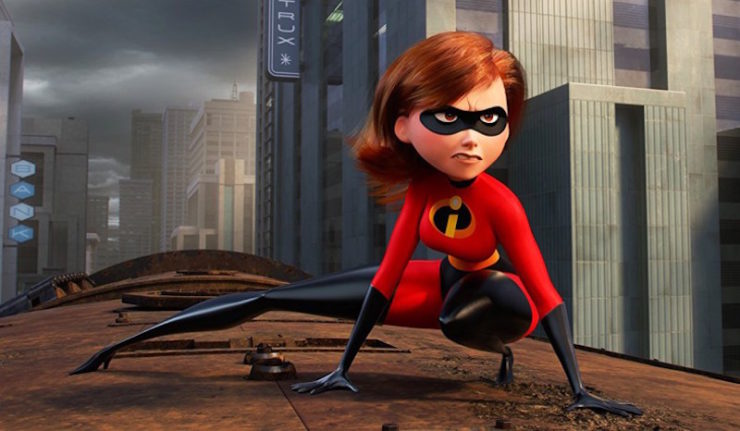I don’t know if Disney•Pixar’s Incredibles 2 is the best superhero movie this year (I mean, Black Panther) but it is the first time this year that as I walked through the theater to leave, I seriously considered ducking into the 10pm showing and watching it all over again immediately. It also has the greatest action I’ve ever seen in a super hero movie—the only thing that even comes close is the opening of X2, with Nightcrawler bamfing through the White House. The action sequences are breathtaking in the sense that I literally held my breath during a couple of them. And again, as a hardbitten, cynical movie critic I tend to spend my movie time watching myself watch the movie, gauging audience reactions, analyzing themes. Here I was just…happy.
And yet! There were also enough messy, contradictory ideas built into the film that I was able to think about it, too.
Before we go below the cut: The first few paragraphs of this review are non-spoiler, but I do go into a bit more depth later on. I’ll warn you before we get into spoiler territory. Also, and more important: there are flashing lights and hypnotic screens in the film that might be triggering if you have epilepsy, so please be cautious if you need to.
So to begin with the basics! Incredibles 2 is preceded by “Bao,” an adorable short that plays on the same family reconciliation themes that infuse the adventures of the Parrs. This might be one of the weirdest Pixar shorts, and it’s also their best ode to food since Ratatouille.
The plot of Incredibles 2 is something of a retread of the last film: superhero-ing is still considered an illegal activity, so much of the action has to be illicit. There are a few groups that want to make supers socially acceptable again, and they bet on Helen Parr’s competence as Elastigirl to convince people that the government is mistaken. The main plot arc features one super-true-believer trying to create a grassroots movement to change the anti-super laws, and their confidence in Elastigirl is more than rewarded, as she proves to be a genuinely great hero, acting out of a genuine concern for people, and the belief that it’s her responsibility to make the world a better place. This is far more than just Mr. Incredible’s mid-life crisis from the first movie. My one quibble with The Incredibles was that because it was satirizing ’50s culture and sitcom tropes, it occasionally played up rigid gender norms—like when a superheroine uses her super strength to punch a civilian she thinks is the Other Woman. Here though, Helen gets most of those truly great action set pieces. We get to see that she’s resourceful, quick-thinking, absolutely determined. It’s a fun irony that someone whose power is stretching is absolutely inflexible when it comes to her moral core. She also works with multiple other women, providing not just support to her own super-daughter, but being revealed as an inspiration to women in many fields, and becoming a mentor to a younger female hero.
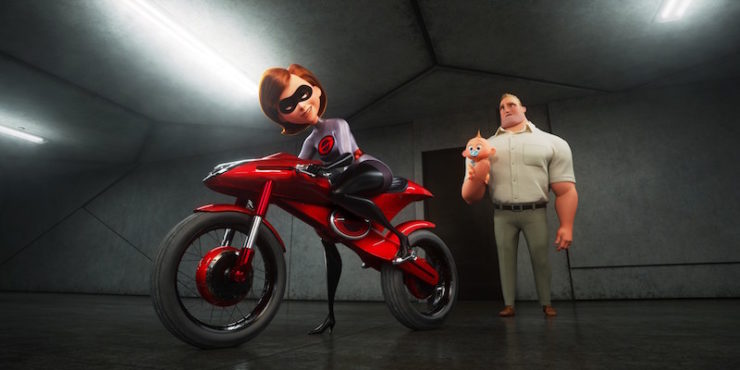
Meanwhile Mr. Incredible’s weaknesses are fully exploited. The caper in this film isn’t going to be solved by a bunch of punching, it needs Helen’s finesse and subtlety. Instead he has to live up to the awesome line from the last film, and embrace the fact that his family is his greatest adventure. Learning how to be there for Dash and apologize to Violet might not seem like flashy hero stuff, but it’s actually more important for his kids to know their dad will be there for them. The film does an excellent job of balancing more sitcom humor with the real exhaustion and elation that comes with caring for children full time. And finally, in another excellent continuation of the last film, Frozone gets to be much more than the BFF/sidekick he was last time. Here he’s a leading member of a new super team, he has his own fans clamoring for his autograph, he gets one of the best hero moments, and he also gets some of the funniest lines in the film—one of which can be read as a riff on Infinity War.
When the film begins the kids are three months into being told that they can be heroes, so they’re still pretty shaky. Violet gets to show a bit more initiative, and Dash still mostly just runs fast, but he also gets some good comic bits. The two best parts of the movie, predictably, are Jack-Jack and Edna Mode. Jack-Jack is used beautifully, each newly revealed power more terrifying and fun than the last. This is also truly an innovation on the last film. If The Incredibles was about superheroes in the suburbs, I2 builds on that to show us how difficult it is to parent a super-child who not only can’t control his abilities, but has no interest in doing so. When he gets mad, he bursts into flame. When he gets scared, he goes into another dimension. The logic is inarguable, and you can’t exactly make him stop. So how do you parent that? How do you work with his abilities rather than against them?
And then there’s Edna. I don’t want to say too much, because if you haven’t seen it yet I would never spoil it for you, darling. She was perfect in the last movie, and she’s even better here. My only problem is that she isn’t in the movie enough, but she’s like caviar–you really should only have a little. I should also mention that at the screening I saw, people not only applauded as the film began (which I don’t think I’ve ever seen in New York?) but there was an explosion of applause and whistling for Edna. As there should be.
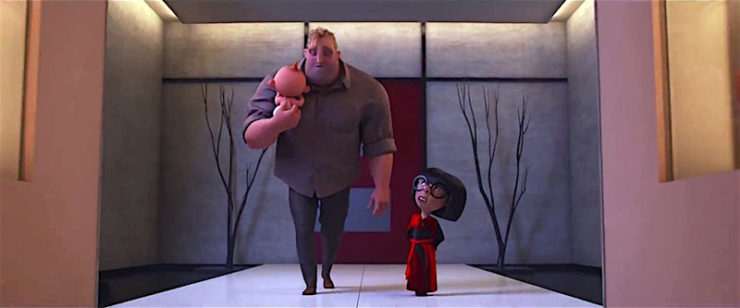
OK. We’ve covered the bases, but now I want to dig into what the film is about, and to do that I gotta talk about villains, and to that I gotta spoil everything. So duck on out of here if you haven’t seen the film.
I know some people think The Incredibles is an ode to Objectivism. (True genius is punished by mediocrity, participation trophies are mocked, and while in hiding, the family is even saddled with the name Parr—i.e. at par, average, mediocre, etc.) Much like Invasion of the Body Snatchers and A Wrinkle in Time could be read as either anti-communist, or anti-anti-communist hysteria, I tend to read it as pro-creativity and anti-conformity. What I also saw in The Incredibles, which was shockingly prescient for 2004, was a critique of the laserlike nerd rage that is currently slicing through fandoms large and small. Mr. Incredible didn’t do exactly what super fan Buddy wanted, so Buddy poured a ton of money and energy into becoming Syndrome, a hateful whiny manbaby, and made it his mission to ruin supers for everybody…you know, instead of just accepting Mr. Incredible’s “No,” making his own path, and becoming a science hero, as he clearly had the skill to do. He was also willing to murder a woman and pair of children (whom, as far as he knew, were all ordinary civilians) and fridge his own girlfriend to turn Mr. Incredible into a gritty reboot of himself. I have no doubt that a few years later he would have simply doxxed and SWATted all the supers instead of luring them to Nomanisan Island. (Which, um, by the way? There’s another strike against Objectivism.)
I think Incredibles 2 continues both of these themes. There is plenty of stuff about how the government just doesn’t work in general, and doesn’t understand heroism specifically, which leads to the idea that the common man has to be sold superheroes, and given a palatable image of friendly neighborhood demigods, which leads us into the film’s true theme.
When The Incredibles premiered in 2004, it launched itself into a world where James Gunn’s first dark superhero deconstruction, The Specials, had come out to very little attention in 2000, and M. Night Shyamalan’s superhero deconstruction, Unbreakable, came out to too much attention, only becoming a cult film later. Bryan Singer had directed two X-Men movies, and Brett Ratner hadn’t yet kicked the franchise in the stomach. Sam Raimi had directed the first two Spider-Man films—Spiderman 2 had only come out a few months earlier, and Emo Peter Parker had not yet kicked the franchise in the stomach. From Hell, League of Extraordinary Gentlemen, Hellboy, and the Blade films were all marketed more as gothy horror-adjacent movies rather than “superhero” movies. Ang Lee’s take on The Hulk was… not embraced. But it got off easy compared to Ben Affleck’s attempt at Daredevil.
Buy the Book
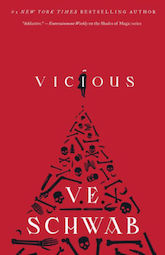

Vicious
And that was pretty much it?
Constantine hit theaters the following year, with comics fans rejecting the film for casting Keanu Reeves, and the rest of America just being confused because Urban Fantasy wasn’t really a thing yet. Four months later, Batman Begins launched Christopher Nolan’s gritty reboot of Batman. And it was only a month after that that Fantastic Four came out—The Incredibles, with their Fantastic Four-esque powers, were released into a world where only the crappy Roger Corman quartet had hit screens. And people had never met either the Chris Evans’ Johnny Storm nor the Michael B. Jordan Johnny Storm. Iron Man was still four years away from saving Robert Downey Jr.’s career. Samuel L. Jackson was still four years away from walking into Tony Stark’s living room and announcing the Avengers Initiative. The MCU didn’t exist yet, and the concept of watching (at least) two superhero movies a year was unimaginable. And speaking of Mr. Jackson…
Nick Fury? Falcon? War Machine? Black Panther? Shuri? Nakia? General Okoye?
Nope. If you wanted a Black superhero—but you didn’t want a Goth Dampiel—you had Frozone.
I still remember explaining to friends of mine that, no, The Incredibles’ deconstruction of the superhero mythos, while awesome, wasn’t that revolutionary—a book called Watchmen did it in 1986. Our innocent eyes were still five years out from witnessing Zack Snyder’s violent Randian blimp sex.
No Heath Ledger Joker, no X-Men retcon, no Logan, no Deadpool, no Super, no Kick Ass, no Henry Cavill CGI upper lip, no Batffleck, no Wonder Woman, no Netflix/Marvel hybrid shows, no Agents of S.H.I.E.L.D., no Agent Carter, no Runaways, no Cloak & Dagger, no whomever I’m missing here. (I know I’m missing people/shows here.) No ongoing battle between Marvel and Star Wars for box office supremacy—which has since been rendered moot by Disney buying both of them.
Now just look through that list of stuff that didn’t exist yet. Comics fans knew a lot of these characters, but they weren’t yet the mainstream cultural juggernaut that they’ve become. So I think it’s extremely interesting that this film bundles two ideas together to create a villain: the charge that we’ve all become too dependent on screens and passive forms of entertainment, and that we’ve entrusted our safety to superheroes. (Which, I have to say, I admire the eggs on Brad Bird to blast superhero films in the middle of his own superhero film.) The real conflict in this film is between Win Deavor and his sister Evelyn.
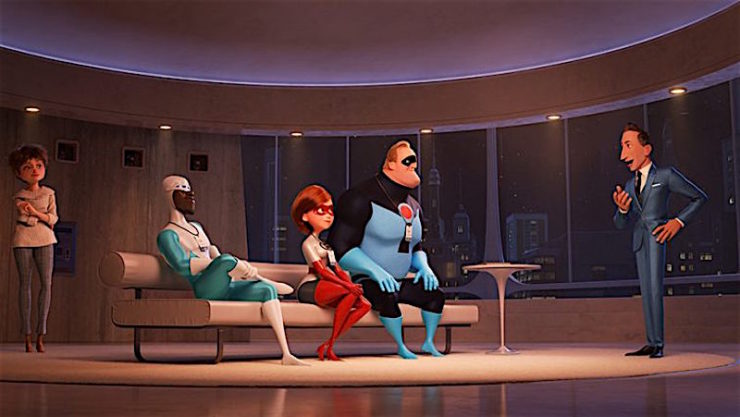
Win, who’s expanded the family holdings through his tech company, wants to fund the campaign to bring superheroes back, thus outsourcing human safety. His sister, the company designer, seems to want to promote Elastigirl as a form of feminist solidarity. As we learn early on, she’s actually using an evil persona called “Screenslaver” to scare people away from both their dependence on screens and passive entertainment, and heroes. And, as in Black Panther, the villain here is not exactly, um, wrong? But like Killmonger, Evelyn Deavor is only too willing to allow innocents to take the fall for her revolution. While Win’s shiny happy reliance on heroes isn’t healthy, her utter callousness toward the people she’s claiming to want to “help” shows us that she doesn’t really have the moral core to create a better future. And while tying these two ideas together may seem like a stretch worthy of Elastigirl herself, the more I’ve thought about it, the more it worked for me.
Obviously on the surface, the whole “let’s not depend on superheroes” thing only seems to work in the high tech alt-’60s wonderland of The Incredibles, or as a commentary on the DCU and MCU. But once we dig even slightly into our own world, we can see that we have largely outsourced our morality and eloquence and sense of outrage at injustice—we express our horror at atrocity via memes, jokes, mis-attributed quotes passed along from email forwards to Facebook shares. We’ve outsourced our research to Snopes. We like and retweet other people’s reports on injustice as though we’re actually doing something.
We rely on the vague hope that eventually the information will get passed along to the right hero or conscientious government official, or, I don’t know, Buddha, and that that person will act on the tip. And please understand that when I say “we” I’m goddamn including “me” in that—I’ve done more than my share of sharing.
What the Incredibles pointed out, both in their first screen outing and their latest one, is that we can’t rely on that. If Win and Evelyn’s parents had taken care of themselves and dashed for the saferoom, they would have lived. If Helen hadn’t taken it upon herself to go rescue her husband, Syndrome probably would have killed him. (I know, her initial call is what got him caught in the lair, but I don’t think he was making it off that island regardless.) If the kids hadn’t taken the initiative to step up and rescue their parents, everyone on the boat, plus all of the New Urbem citizens in the vicinity of the harbor, would have died in the boat crash.
And I know I’m maybe muddling the message here by taking moral advice from a cartoon, but I think this is the biggest argument against Randian thinking here: it’s on us to be the heroes. It’s on us to recognize when the government is enacting unfair laws, and to work to change those laws—maybe not through creating portals through spacetime or running at lightspeed, but Win Deavor’s path of grassroots organizing and education seemed to work pretty well. By the end of the film people have been poked enough to realize that they are allowing themselves to be too passive, and they’ve recognized that they’ve been unfair to the supers. A whole new team of powered people have come out of hiding, and will hopefully be able to live better, more fulfilling lives in a society that values their gifts. The Incredibles have once again bonded through hero-ing as a family. Brad Bird has expanded his original story into a universe that could tell a lot more stories, and inspire a lot more heroism.
Leah Schnelbach thinks we can all be heroes, even i just for today. Come monologue with her on Twitter!










